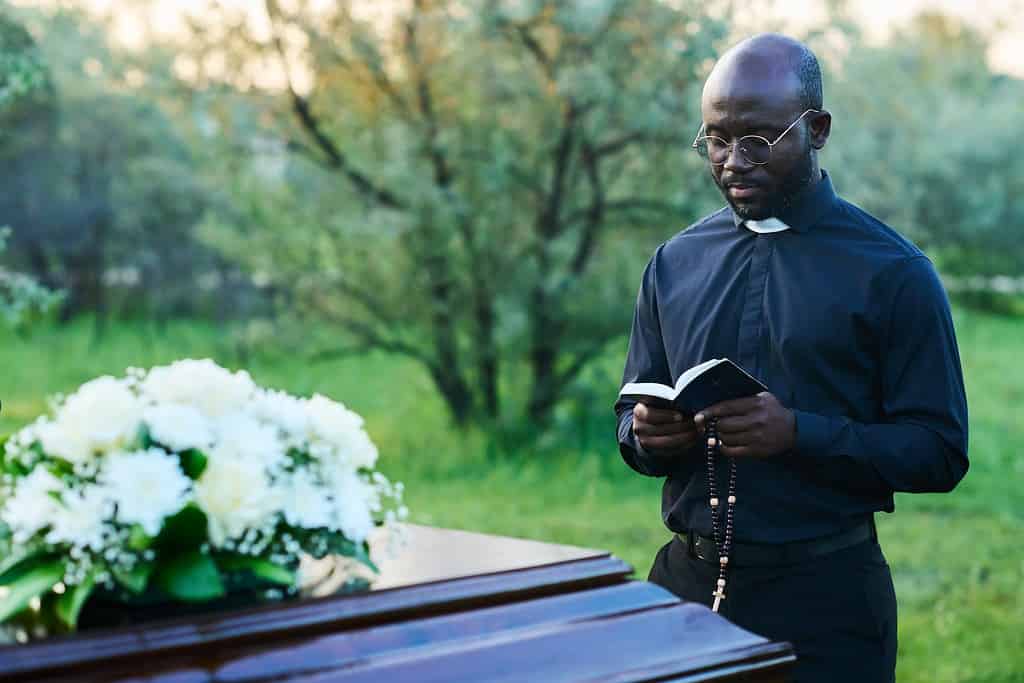Funeral directors have gone by many different names over the centuries, but their primary role in the community has remained relatively the same. They serve to care for the dead and prepare bodies for disposition.
Even though funeral directors have existed for all of modern history, little is known about these death care professionals. When someone is tasked with arranging funeral services they often have a lot of questions about what the funeral director does exactly. If you’re one of those people you’ll find this funeral director Q&A very helpful.
Are funeral directors different from morticians?
Mortician is another name for a funeral director that has become outdated over the years. Essentially, mortician is the title given to funeral directors that prepare the body for disposition. This could involve the use of embalming fluid, though many funeral directors prefer to avoid it when possible because it is highly toxic. Other responsibilities of a mortician include cleaning the body, applying makeup and facial or body reconstruction.
This profession is much older than many people realize. Evidence of morticians goes back to at least the time of the ancient Egyptians 5,000 years ago. Some of these skilled professionals used a very different kind of embalming technique that took months to complete – mummification.
Do funeral directors arrange burials, cremations or both?
A funeral director can arrange both burials and cremations, however, they may specialize in one or the other. For example, at Cremation.Green our funeral director provides eco-friendly funeral services that include clean flame cremation, water cremation and natural burial. They can also help you arrange natural organic reduction (NOR), a completely different type of disposition.
Will I work directly with the funeral director to arrange services?
You should be working directly with the funeral director, especially when you are arranging services in the beginning. The top responsibility for funeral directors is arranging funeral services and carrying out the necessary steps to complete the disposition. They also help the family make arrangements by providing expert advice and insight on all the options and the legal requirements.
The funeral director will likely have support staff that you will also interact with throughout the process. Another thing to consider is you may interact with more than one funeral director at the funeral home.
Do funeral directors really work 24 hours a day?
A lot of the time, yes. But that doesn’t mean a funeral director is working 24/7/365. Unless it is a family-run funeral home in a small town with no other providers, it’s highly unlikely a funeral director is working 24 hours every day of the year.
Each funeral home comes up with its own scheduling system. Often a funeral home director has assistants that can handle many tasks, and retrieval techs can be hired to transport the body. The one function a funeral director absolutely does need to be on-call for is to talk with the family and make the funeral arrangements. Today, that can be done in-person or over the phone in many cases.
Some funeral homes circumvent the issue by having more than one director. The funeral directors split the workload. In this situation, it’s common for a funeral director to work two 24-hour shifts a week.
Does the funeral director live at the funeral home?
Believe it or not, many funeral directors do live onsite at traditional funeral homes. Living in a house that’s adjacent to the funeral home or part of it is certainly more convenient for funeral directors given that they are technically on-call 24 hours a day when they’re working.
Of course, today funeral directors don’t need to physically be at the funeral home to connect with families and initiate the process of arranging services. However, most funeral directors are required to be within 30 minutes of the funeral home when they are on-call.
Does a funeral director have to be licensed?
Colorado is the only state that doesn’t require funeral directors to be licensed. There are a number of legal requirements and safety protocols that must be adhered to when providing funeral services. Requiring a license ensures that funeral directors have received proper training and can perform services safely.
Although having a license is a requirement almost everywhere, it’s a relatively new one for funeral home directors. It didn’t come about as a formal profession until 100 years ago, and states didn’t begin requiring funeral director licenses for a few more decades.
What kind of training is needed to become a funeral director?
Before a funeral director can receive a license, they have to complete required education and training. You may or may not need a college degree depending on the state. Usually, a person starts by entering an accredited funeral director program and progressing on to an internship.
After completing the internship most states also require that license applicants pass a licensing exam. However, actually working as a licensed funeral director may require an apprenticeship as well.
Today the process of becoming a funeral director is far different than it was several decades ago. Back then many funeral homes were family businesses. Often one of the funeral director’s sons would be trained to take over the family business. The modernization of the death care industry has led to more variation in funeral home business models and who becomes a funeral director. One recent trend is more women training to become funeral directors.
Got more questions about funeral directors or need information that’s specific to Texas? Our funeral director is happy to answer all of your questions and provide assistance in helping you plan a funeral service. You can call, text or email any hour of the day to get direct assistance.





